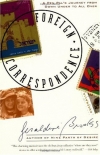Foreign Correspondence: A Pen Pal's Journey by Geraldine Brooks (finding audrey .TXT) 📗

- Author: Geraldine Brooks
Book online «Foreign Correspondence: A Pen Pal's Journey by Geraldine Brooks (finding audrey .TXT) 📗». Author Geraldine Brooks
But the fires turned and took their tragedy to other families. We went inside to sleep. It was the first time in our lives that the three of us had ever been together alone. Until then, there had always been at least one husband present.
Early one afternoon a week later, the funeral parlor called. They had Daddy’s ashes. Darleen and I drove down to the funeral parlor and collected the box. It was oblong, cardboard, and surprisingly heavy. Inside was a plastic bag with a twist-tie.
We turned the car north, toward the most beautiful of the pink sand beaches. It was raining at last, a fine mist that fell like a salve on the stricken bushland. Across Pittwater, faint columns of smoke rose from blackened tree stumps as the rain doused the last of the smoldering embers.
I knew those dry coastal forests; I knew they had already begun their recovery. The fire had split open ancient seed pods that had waited years for their moment to germinate. The blasted gums would shed their injured skins as easily as a model shrugging off a jacket. And in just a few days the cabbage-tree palms would send tender new green leaves straight out of their roasted, lifeless-looking trunks. But the whole process seemed so extravagant, designed by a careless and profligate god.
I glanced at the box of ash on the seat between us. There was waste there, too. I thought of all the things my father learned in his long life: how to pick up the sheet music for a song he’d never heard and perform it perfectly; when to replace a fused participle with a possessive and a gerund; how to be a father to the best of his ability. A line from Wilfred Owen’s poem “Futility” ran through my head.
Was it for this the clay grew tall?
Oh, what made fatuous sunbeams toil to break earth’s sleep at all?
When we got out of the car, the sea air had an unusually brisk edge for a midsummer’s day. We had thought to give his ashes to the sea, the rolling Pacific that bracketed the beginning of his life as a towheaded boy in California, and its end as a frail old man on a bed by a picture window in Sydney. But at the far end of the beach, where the land rises in soft dunes to a hard nob of rocky bushland, we noticed a piece of fallen cliff: a huge cube of sandstone sundered as if an angry giant had brought down his fist and smashed it in two. It was impossible to imagine a grander headstone.
The wind was raw on the headland. We climbed higher as the misty rain swirled and the surf reached for us, its tendrils of white foam curling up the rock face. When we were above the giant V of the split, we pulled out his last whiskey bottle. We each drank a shot, toasting his life. We poured the ashes down the golden sandstone, and the rest of the whiskey after them. The rain and the salt spray carried them far away.
Reader’s Companion
About the Book
We are products of our environment. And some of us rebel against that environment—perhaps traveling the world and then living far from home if we grew up in a place that felt too small, or creating a cocoon of family and friends if our childhood was full of upheaval.
In her memoir, Foreign Correspondence, we see how author Geraldine Brooks rebels against and then embraces her secure and rooted upbringing in suburban Sydney, Australia. Brooks becomes a foreign correspondent who travels from war zone to famine and finally arrives at a deeper understanding of the value of family, home, and stability in every person’s life. She tells that story in a way that carries her distinct stamp. She looks at the lives of others.
Throughout her childhood in the turbulent 1960s and 1970s (turbulent almost everywhere but Australia, it seemed to a young Brooks), she corresponded with pen pals around the world. More than twenty years later, Brooks is surprised to find that her father has saved those letters. After reading them, she wonders what became of those childhood correspondents, and she decides to find out. Traveling from Maplewood, New Jersey, to Nazareth, Israel, to St. Martin de la Brasque, France, to a New York City nightclub, Brooks tracks down her pen pals. While doing so, she hears stories that cross latitudes and include tales of conscription, anorexia nervosa, peace, security, death, provincialism, and family. She also learns that she and her former correspondents, all grown up now, want many of the same things, and most have little to do with the excitement that she craved when she was a young girl. As Brooks writes of her former pen pals, “[O]ne of them is dead, one is famous, one has survived wars, one overcome prejudice. And of all of them, it is Janine, living undramatically in the narrow circumference of her tiny village, whose life now seems to me most enviable.”
Brooks’s former work as an award-winning foreign correspondent for The Wall Street Journal and her personal travels from Sydney, Australia, to making her current home with her husband and son in Waterford, Virginia, give her a second sight that many outsiders possess. She writes a tale that is at the same time personal and universal. She opens windows. She amuses. She enlightens.
About the Author
Geraldine Brooks is also the author of Nine Parts of Desire: The Hidden World of Islamic Women and a





Comments (0)